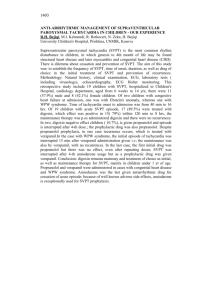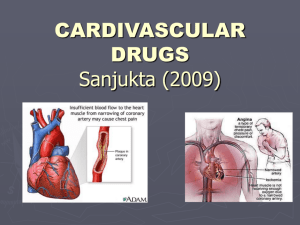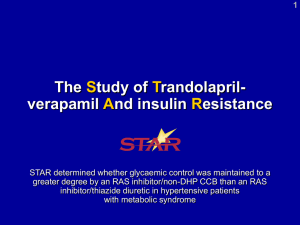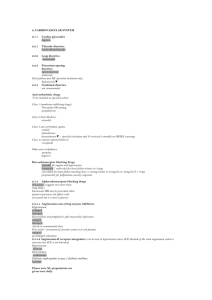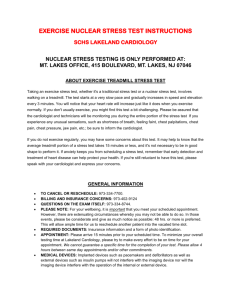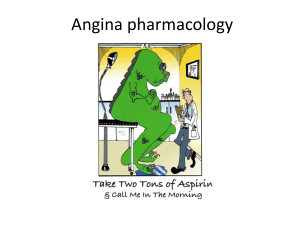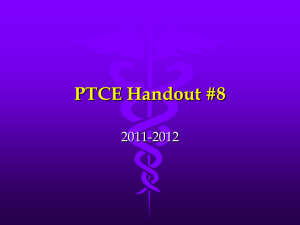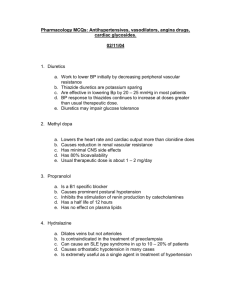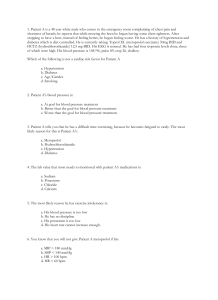INVEST slide presentationJan final2
advertisement
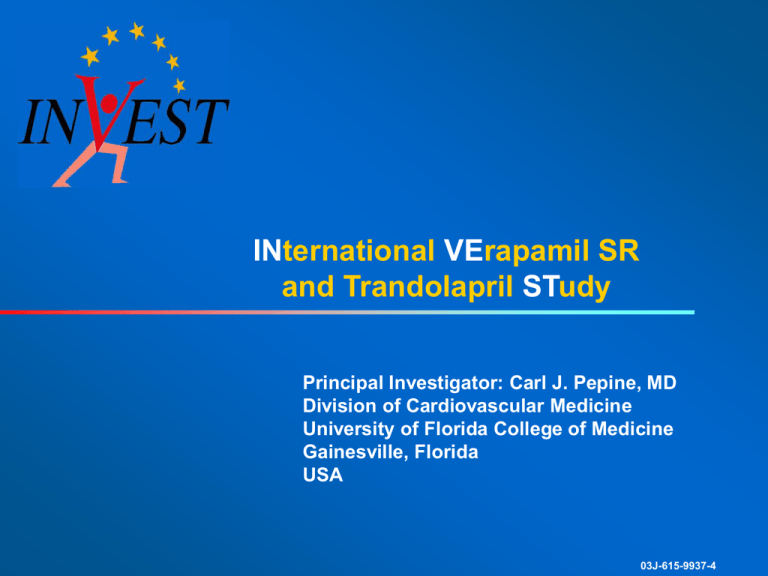
INternational VErapamil SR and Trandolapril STudy Principal Investigator: Carl J. Pepine, MD Division of Cardiovascular Medicine University of Florida College of Medicine Gainesville, Florida USA 03J-615-9937-4 What Is INVEST? • INVEST (the INternational VErapamil SR and Trandolapril STudy) is the first randomized, prospective trial to exclusively study patients with hypertension and coronary artery disease (CAD). • INVEST is also the first completed study to follow the guidelines of the Sixth Report of the Joint National Committee on Prevention, Detection, Evaluation, and Treatment of High Blood Pressure (JNC VI) in using lower blood pressure goals for special patient populations. INternational VErapamil SR and Trandolapril STudy Leading Causes of Mortality Worldwide 7.4 Ischemic Heart Disease 13.7 5.1 Cerebrovascular Disease 9.5 3.5 Acute Lower Respiratory Infections 6.4 2.3 HIV/AIDS 2.2 Chronic Obstructive Pulmonary Disease 4.2 2.2 Diarrheal Diseases 4.2 4.1 2.2 Perinatal Conditions 4.0 1.5 Tuberculosis 2.8 Millions 1.2 Cancer of the Trachea/bronchi/lungs 2.3 % of Total Deaths 1.2 Road Traffic Accidents 2.2 0.0 INternational VErapamil SR and Trandolapril STudy 2.0 4.0 6.0 8.0 10.0 12.0 14.0 16.0 World Health Report 1998 Hypertension– A Risk Factor for CV Morbidity and Mortality Coronary Disease Stroke Biennial age-adjusted rate per 1000 50 Peripheral Arterial Disease Cardiac Failure 45 40 35 Normal 30 Hypertension 25 20 15 10 5 0 Men Women Men Women Men Women Men Women Risk of CV events by hypertensive status in subjects aged 35 to 64 years, Framingham study, 36-year follow-up. INternational VErapamil SR and Trandolapril STudy JAMA. 1996;275:1571-1576 Objective To compare mortality and morbidity outcomes in patients with hypertension and CAD treated with either: Verapamil SR–based treatment strategy • Verapamil SR alone, or • In combination with trandolapril, or • In the triple combination (verapamil SR, trandolapril, and hydrochlorothiazide [HCTZ]) Atenolol-based treatment strategy • Atenolol alone, or • In combination with HCTZ, or • In the triple combination (atenolol, HCTZ, and trandolapril) Additional outcomes included blood pressure control, new-onset diabetes, and angina. INternational VErapamil SR and Trandolapril STudy JAMA. 2003. 290;2805-2816 Rationale for INVEST • Limited data is available for the management of patients with hypertension and CAD. • However, ß–blockers and HCTZ became the standard of care. • Verapamil appears to reduce the risk of death and reinfarction in CAD patients* but rarely has been studied in large randomized hypertension trials. • The combination of verapamil SR and trandolapril may provide better BP control than monotherapies.* INternational VErapamil SR and Trandolapril STudy JAMA. 2003. 290;2805-2816 INVEST Drug Strategies • INVEST is not simply a comparison of 2 drugs; it is a comparison of 2 multidrug treatment strategies. • It was anticipated that few patients would have their blood pressure controlled by monotherapy. • Most patients would need a combination either of verapamil SR plus trandolapril or of atenolol plus hydrochlorothiazide (HCTZ). INternational VErapamil SR and Trandolapril STudy Rationale for Verapamil SR Verapamil SR has proven efficacy and safety in several large-scale clinical trials: DAVIT II* Treatment with verapamil after an acute myocardial showed a significant reduction in major events, death, or reinfarction (20% risk reduction in total mortality) VAMPHYRE† Verapamil’s effects on the autonomic nervous system are favorable *Am INternational VErapamil SR and Trandolapril STudy J Cardiol. 1990;66:779-785 †Am J Hypertens. 2001;14:1083-1089 Rationale for Trandolapril In large-scale clinical trials, trandolapril has demonstrated efficacy and safety in hypertensive patients and in post-MI patients with ejection fraction 35%. TRACE* Trandolapril slowed a significant risk reduction with oncedaily dosing. Other ACE-Inhibitors were used with multiple daily dosing for post MI-patients. • • • • All-cause mortality risk reduced by 22% Cardiovascular mortality risk reduced by 25% Progressive to severe CHF risk reduced by 29% Sudden death risk reduced by 24% INternational VErapamil SR and Trandolapril STudy * Lancet. 1999;354:9-12 * N Engl J Med. 1995;333:1670-6. Rationale for Atenolol and HCTZ • Atenolol is indicated for patients with essential hypertension, angina pectoris, and acute MI • HCTZ is widely used for treating essential hypertension and edema • Along with diuretics, ß-Blocker became the standard of care for hypertensive patients with CAD* INternational VErapamil SR and Trandolapril STudy * Arch Intern Med. 1993;153:154-183 Key Features of INVEST Size 22 576 hypertensives with CAD recruited from 14 countries Mean Follow-up 2.7 years Unique Features • Largest CV outcomes trial ever completed in hypertensive patients with CAD • First trial to use JNC VI Blood Pressure Goals • First major CV outcome trial to exclusively recruit hypertensive patients with CAD • First CV outcome trial using a fixed-dose combination (verapamil-trandolapril) as part of treatment regimen INternational VErapamil SR and Trandolapril STudy JAMA. 2003. 290;2805-2816 Patient Enrollment 23 482 Patients Assessed for Eligibility • 508 Ineligible • 398 Administratively Retired or Withdrew Consent 22 576 Patients Randomized 11 267 Verapamil SR– Based Strategy 11 309 Atenolol– Based Strategy 11 267 Included in Analysis 11 309 Included in Analysis INternational VErapamil SR and Trandolapril STudy JAMA. 2003. 290;2805-2816 Participation Germany Canada 862 Sites 14 Countries Italy Hungary France USA Spain Turkey Mexico Cuba Australia New Zealand INternational VErapamil SR and Trandolapril STudy JAMA. 2003. 290;2805-2816 Treatment Strategies Verapamil SR Strategy Atenolol Strategy Diabetes, Renal Dysfunction, Heart Failure–Add Trandolapril Step 1 Verapamil SR 240 mg Step 1 Atenolol 50 mg Addition of Drug Step 2 Verapamil SR 240 mg + Trandolapril 2 mg Step 2 Atenolol 50 mg + HCTZ 25 mg Increase Dose Step 3 Verapamil SR 180 mg twice daily + Trandolapril 2 mg twice daily Step 3 Atenolol 50 mg twice daily + HCTZ 25 mg twice daily Addition of Drug Step 4 Verapamil SR 180 mg twice daily + Trandolapril 2 mg twice daily + HCTZ 25 mg Step 4 Atenolol 50 mg twice daily + HCTZ 25 mg twice daily + Trandolapril 2 mg Increase Dose and/or Add Nonstudy Drug(s) Study drugs could be titrated: verapamil SR 120-480 mg/d; trandolapril 0.5-8 mg/d; atenolol 25-200 mg/d; HCTZ 12.5-100 mg/d INternational VErapamil SR and Trandolapril STudy JAMA. 2003. 290;2805-2816 Inclusion Criteria • Aged 50 years • Essential hypertension requiring drug therapy (JNC VI) • Documented CAD –Diagnosis of classic angina pectoris –Remote MI –Abnormal coronary angiogram –Abnormalities on 2 different types of stress tests • Ability and willingness to sign informed consent INternational VErapamil SR and Trandolapril STudy JAMA. 2003. 290;2805-2816 Exclusion Criteria • Unstable angina, angioplasty, coronary artery bypass graft, stroke within previous month • ß-Blocker use within 2 weeks of randomization for an MI that occurred in the previous 12 months • Patients without a pacemaker and any of the following: sick sinus syndrome, bradycardia ( 50 beats/minute), AV block 1st degree • Atrial fibrillation/flutter with Wolff-Parkinson-White syndrome • Severe heart failure (New York Heart Association Class IV) • Hypersensitivity or contraindications to study medication • Concomitant illnesses that may have affected outcome variables, in which life expectancy was 2 years or less, or that were likely to require frequent hospitalizations and/or treatment adjustments INternational VErapamil SR and Trandolapril STudy JAMA. 2003. 290;2805-2816 Baseline Demographics • Mean Age = 66 years • 52% Female • 53% Prior MI or Abnormal Angiogram • 48% Caucasian • 67% Classic Angina • 36% Hispanic • 28% Diabetic • 13% Black • 55% Dyslipidemia • Mean BMI = 29 • 46% Past Smoking History INternational VErapamil SR and Trandolapril STudy JAMA. 2003. 290;2805-2816 Pertinent Baseline Characteristics Verpamil SR–Based Group Atenolol-Based Group (n = 11 267) (n = 11 309) Females (%) 52 52 Caucasians (%) 49 48 Blacks (%) 13 14 Hispanics (%) 36 36 Age > 70 years (%) 33 34 Diabetes (%) 28 29 Mean BMI (kg/m2) 29 29 MI (%) 32 32 Abnormal Angiogram (%) 39 40 Classic Angina Pectoris (%) 66 67 CABG or PCI (%) 27 27 P = Not significant–comparing all characteristics between strategies INternational VErapamil SR and Trandolapril STudy JAMA. 2003. 290;2805-2816 Antihypertensive Drugs at 24 Months Verapamil SR–based group Atenolol–based group 100 82 80 78 % Patients 63 60 60 52 44 43 43 40 20 (288*) (76*) (4*) (4*) (29*) (29*) 0 Verapamil SR Atenolol Trandolapril HCTZ Nonstrategy •Mean dose (mg/d) P < 0.001 for all strategy drugs INternational VErapamil SR and Trandolapril STudy JAMA. 2003. 290;2805-2816 24 Months Mean Blood Pressure Change in BP (mm Hg) 0 150 mm Hg Systolic 130 Verapamil SR-Based Group Systolic Diastolic -5 -10 -10.0 -10.2 P = 0.26 -15 -20 -18.7 -19.0 P = 0.41 110 Atenolol-Based Group 90 Diastolic 70 0 1.5 3 4.5 6 12 18 24 30 36 42 48 Verapamil* (n) 11,267 8594 7738 7119 8558 8639 7758 7842 5721 3659 1458 796 Atenolol† (n) 8676 7726 7148 8573 8694 7710 7850 5834 3679 1473 817 11,309 Time (Months) INternational VErapamil SR and Trandolapril STudy * Verapamil SR–based group † Atenolol–based group JAMA. 2003. 290;2805-2816 Alive, Free of MI or Stroke (Primary Outcome) 100 RR = 0.98, 95% CI 0.90, 1.06 CI for equivalence 0.83, 1.20 Cumulative % 95 90 85 Log Rank P = 0.57 80 75 Verapamil SR–based group Atenolol-based group 0 6 12 18 24 30 36 42 48 54 60 Months • Total follow-up 61 835 patient-yrs • Mean follow-up 2.7 yrs/patient • Annual event rate = 3.6% INternational VErapamil SR and Trandolapril STudy JAMA. 2003. 290;2805-2816 Primary and Secondary Outcomes Unadjusted Relative Risk with 95% CI Verapamil SR– based group Atenolol– based group n = 11 267 n = 11 309 No. (%) No. (%) Outcome First Event 1119 (9.93) P value 1150 (10.17) 0.57 Death 873 (7.75) 893 (7.90) 0.72 Nonfatal MI 151 (1.34) 153 (1.35) 0.95 Nonfatal Stroke 131 (1.16) 148 (1.31) 0.33 CV Death 431 (3.83) 431 (3.81) 0.94 CV Hospitalization 726 (6.44) 709 (6.27) 0.59 0.80 Verapamil SR– based group Better INternational VErapamil SR and Trandolapril STudy 1.0 1.2 Atenolol– based group Better JAMA. 2003. 290;2805-2816 Outcomes in Patients Without Diabetes at Baseline Unadjusted Relative Risk with 95% CI Outcome Verapamil SR– based group Atenolol– based group n = 8098 n = 8078 No. (%) No. (%) New-Onset Diabetes 569 (7.03) Death or New-Onset Diabetes 1050 (12.97) Primary Event or New-Onset Diabetes 1185 (14.63) 665 (8.23) 1177 (14.57) 1313 (16.25) 0.80 n= patients without diabetes at baseline INternational VErapamil SR and Trandolapril STudy Verapamil SR– based group Better 1.0 1.2 Atenolol– based group Better JAMA. 2003. 290;2805-2816 Summary and Conclusions • Initiating treatment in hypertensive patients with CAD with either a verapamil SR–based treatment strategy or an atenolol-based treatment strategy results in equivalent clinical outcomes and very similar blood pressure control. • Either strategy requires multiple drugs (trandolapril and/or HCTZ) in most patients to achieve BP goals. • Prevention of death and diabetes with the verapamil SR– based treatment strategy requires confirmation and could have important public health implications. INternational VErapamil SR and Trandolapril STudy JAMA. 2003. 290;2805-2816 INternational VErapamil SR and Trandolapril STudy Abbott Laboratories 2003 December 2003 03J-615-9937-4 Printed in U.S.A.
